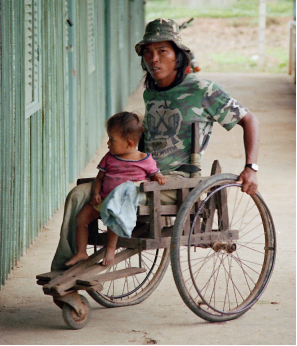 Rotarians Commit to Landmine Eradication
Rotarians Commit to Landmine Eradication
Have you or anyone you know ever stepped on a landmine? Probably not – aren’t we fortunate! If you live in Cambodia, Iraq or Syria, however, you may not have been so lucky. Rotarians have committed time and money to eliminate many ills that plague our world, including long-standing support of landmine eradication. We at the Canadian Landmine Foundation (CLMF) are asking Rotarians to renew their commitment to eliminating these hideous devices.
Landmine use is on the rise and funding has steadily declined over the past number of years. Overall funding for landmine relief is at its lowest point is 10 years. Yet many are still suffering. As many as 18 people, mostly children and women, lose their lives or limbs each day to the catastrophic effects of landmines. The conflicts that led to these landmines may have been over for decades, but the suffering continues. It is time for Rotarians to revisit their commitment to this worthwhile cause. In keeping with this year’s Rotary theme – it is time once again for Rotarians to make a difference.
We are asking clubs and Districts to strongly consider supporting our organization, which has substantial and active Rotary representation. How can you help?
Consider a donation to Canadian Landmine Foundation as part of your International service budget. For as little as US$200 you can fund landmine clearing for a day – that’s another 100 square meters that can be made safe to work, farm and play!
Combine fellowship and fundraising by holding a “Night of a Thousand Dinners.” Use this gathering to not only raise money for a worthwhile cause but also to build awareness and educate those in your community about the devastating effects of landmines.
Donations may be made online at www.canadianlandmine.org or by cheque mailed to: Canadian Landmine Foundation, c/o LCMSDS Wilfrid Laurier University, 75 University Avenue West, Waterloo, ON, N2L 3C5
Wif Wilkenson
2007-2008 President of Rotary International
2009-2013 Rotary Foundation Trustee
Reprinted from:
Beyond Borders Newsletter of Zones 24 & 32/August 2017